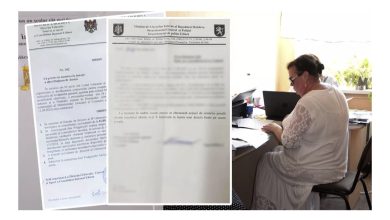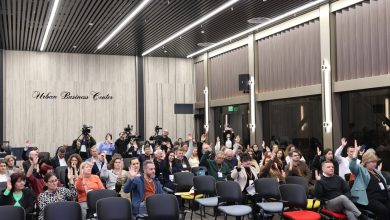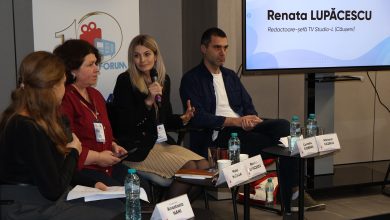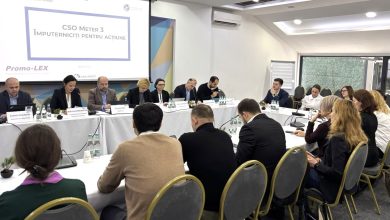Challenges for the press beyond Chișinău: ‘We are rebranding without losing our journalistic identity’

The latest studies by the Independent Journalism Centre highlight a number of worrying trends in the media landscape in the Republic of Moldova. Traditional media is losing ground to social networks, while newsrooms are facing an increasingly acute shortage of human resources. At the same time, the public’s constant exposure to propaganda and disinformation is weakening the role of the press as the fourth estate. These vulnerabilities are not only evident at the central level, but are felt even more strongly in local newsrooms. Several managers from the north and south of the country told Media Azi how they are facing these challenges.
THE PUBLIC HAS MOVED ONLINE. HOW IS THE LOCAL PRESS KEEPING UP?
Representatives of local media institutions see the migration of the public to the online environment as an inevitable phenomenon that must be accepted and managed responsibly. Some say they will continue to publish the print edition as long as they have loyal readers, even if the number of subscriptions is declining. However, in the long term, they are focusing their efforts and resources on developing online platforms.
“Adapting content is becoming a necessity for us. The team is investing time and energy in developing our online presence — through our website and social media. Articles are written and published in an accessible format, accompanied by evocative images and, increasingly, videos to capture attention. At the same time, we are trying to diversify our editorial format: short news items for those who want to get informed quickly; reports and interviews for those looking for in-depth content; podcasts for those who prefer to listen rather than read. In other words, we are “reprofiling” ourselves without losing our journalistic identity,” says Natalia Junghietu, editor-in-chief of the periodical Expresul, which covers the districts of Ungheni and Călărași.
At this stage, the main challenge for journalists is to adapt quickly to change while maintaining the quality of information. Ludmila Topal, director of BasTV – a television, radio and news portal in Basarabeasca – argues that, on the one hand, social networks accelerate access to information, making it more accessible to citizens of all ages and social statuses, vulnerable groups, and residents of villages and small towns. On the other hand, speed sometimes comes at the expense of the accuracy of information. For journalists, this means they have to work faster, but without losing quality.
LACK OF HUMAN RESOURCES, A RECURRING CHALLENGE
According to the Media Needs Study launched by the Independent Journalism Centre (IJC) in June, the lack of human resources is one of the most common problems faced by media outlets in Moldova. This is even more pronounced in local newsrooms. “It’s a never-ending challenge. While at the national level you can go to university to find people, in the regions they generally don’t exist. We motivate people with a decent salary, which in my opinion is one of the best ways to retain an employee in an organisation. At the same time, we continue to train them and demand a high level of skills. So it’s about training plus a good salary,” says Anghelina Gaidarji, director of the news portal Tuk.md in the Taraclia and Cahul regions.
However, one of the main reasons journalists avoid working in the local press is the demotivating salaries. Natalia Junghietu argues that salaries do not reflect the intense work and responsibility that journalism involves. “What saves us, to some extent, are the projects we manage to implement. They give us the opportunity to supplement our salaries or invest in the development of the newsroom, whether it’s equipment, training or online promotion,” the journalist emphasises.
Even so, local newsrooms are making efforts and exploring different strategies to attract new professionals to the field. “We solve this problem through practical training: we invite young people who, although they do not have specialised education, have a desire to learn and possess a certain type of thinking, character traits and skills to join our team. We offer them the opportunity to test themselves in creating materials and support their development. The problem of staff shortages is partly solved by our youth editorial team, which operates within our main editorial office. It is made up of volunteers, and we offer paid work to the most capable and responsible members. We also collaborate with civic journalists, who regularly produce topical material for our online platforms. We are also developing a flexible model that combines traditional and remote work, attracting freelancers and journalists from other regions whom we cannot hire on a permanent basis,” says Ludmila Topal about how they are trying to solve the problem of human resources at BasTV.
ACCESS TO PUBLIC INFORMATION IN THE LOCAL PRESS
At the central level, many journalists point to a reserved attitude on the part of the authorities when it comes to providing information of public interest. This lack of openness manifests itself in delays in providing responses, incomplete data or even unjustified refusals. The situation is no different in certain regions of the country, where cooperation between the authorities and representatives of the profession is difficult, marked by a lack of cooperation, and in some cases the working relationship is practically non-existent.
One example comes from Taraclia, where the director of the Tuk.md portal says that interaction with the city council is almost exclusively limited to court proceedings. According to her, it is practically impossible to obtain information of public interest from the local authority. No city administration employee, including the public relations officer, responds to journalists’ calls. Responses to requests began to arrive only in the last year and only as a result of several court decisions won by the editorial office on the basis of legislation on access to information.
Even so, the quality of the responses is poor: out of a set of ten questions, the mayor’s office responds to at most three, with the rest being ignored. Formally, however, the request is considered resolved. “We have more or less normal relations with the second-level local authorities in Taraclia. But even these boil down to the following situation: when they need us, they kindly invite us to their events, but when it comes to serious questions, such as what the money was spent on or why employees are receiving bonuses again, they get upset and say ‘see you next time’,” says Anghelina Gaidarji about her interactions with the Taraclia District Council.
HOW LOCAL JOURNALISM RESPONDS TO THE CHALLENGES OF DISINFORMATION
The Republic of Moldova is on the verge of parliamentary elections that many experts consider to be among the most important in the country’s post-independence history. At the same time, journalistic investigations and analyses show that this election campaign is taking place in a climate marked by false, manipulative and propaganda information, which makes it increasingly difficult for citizens to distinguish between truthful and misleading information. This wave of disinformation is also a major challenge for journalists, whose role as the ‘fourth estate’ seems to be under threat.
However, some local journalists are optimistic about the situation. The director of BasTV believes that it is precisely in such conditions that the work of the independent local press becomes particularly important. “We are closer to the people, we know their problems and we can talk to them in an accessible language. The role of the fourth estate will be preserved as long as journalists remain faithful to the principles of fact-checking, balance of opinion and transparency. For us, it is important not only to inform, but also to teach the public how to critically perceive the news. This is a form of protection not only against fake news, but also against manipulation in general,” concludes Ludmila Topal.




